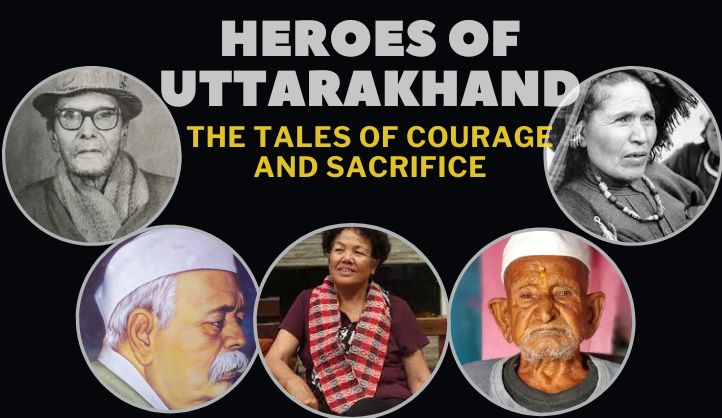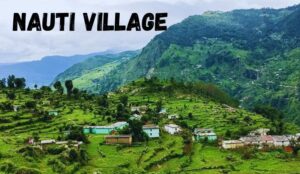Explore the inspiring stories of courage and sacrifice with the “Heroes of Uttarakhand.” From Chandra Singh Garhwali to Gaura Devi, discover the individuals who shaped the region’s history and left lasting legacies. 🏞️🌟 #UttarakhandHeroes #CourageAndLegacy
The Unsung Heroes of Uttarakhand
Uttarakhand, a state in northern India, has a rich history of individuals who have contributed to the freedom struggle and the socio-political development of the region. While it’s important to note that Uttarakhand as a separate state was carved out of the state of Uttar Pradesh in the year 2000, historical figures from the region were actively involved in the broader Indian independence movement. Here are some notable personalities associated with Uttarakhand who played crucial roles in the freedom struggle:
Govind Ballabh Pant (1887–1961):
Govind Ballabh Pant, born in Almora, Uttarakhand, was a luminary in India’s freedom movement. A legal scholar by training, he became a stalwart in the Indian National Congress. Pant played a pivotal role in various phases of the independence struggle, advocating for civil disobedience and non-cooperation. Post-independence, he became the first Chief Minister of Uttar Pradesh and later served as India’s Home Minister. His contributions extend beyond political leadership to shaping the early governance of the nation.
Chandra Singh Garhwali (1905–1939):
Hailing from the Garhwal region, Chandra Singh Garhwali was a formidable freedom fighter known for his unwavering commitment to the cause. He actively participated in the non-cooperation movement, advocating for the rights of the common people. His leadership qualities and dedication earned him respect both within the region and the larger struggle for independence.
Gaura Devi (1925–1991):
Gaura Devi, a prominent environmentalist, hailed from Chamoli district in Uttarakhand. She rose to fame as a leader in the Chipko movement, a grassroots initiative to protect forests from commercial logging. Gaura Devi and the women of Mandal village hugged trees to prevent their felling, bringing attention to the importance of ecological conservation. Her efforts led to a ban on logging in the region, marking a significant victory for environmental activism.
Kunwar Singh Negi (1917–2013):
Kunwar Singh Negi, born in Uttarkashi, exemplified bravery and commitment in the fight against colonial forces. Joining the Indian National Army led by Netaji Subhas Chandra Bose during World War II, Negi became a symbol of resistance from Uttarakhand. His sacrifices in the pursuit of India’s independence are etched in the annals of history.
Bachendri Pal (born 1954):
Bachendri Pal, a native of Nakuri village in Uttarkashi, made history as the first Indian woman to conquer Mount Everest. Beyond her mountaineering achievements, she has been an advocate for women’s empowerment and environmental conservation. Pal’s life reflects a commitment to social causes and breaking gender barriers.
Sunderlal Bahuguna (1927–2021):
Sunderlal Bahuguna, born in Tehri, was a prominent environmentalist and Gandhian activist. His significant contribution to the Chipko movement emphasized the need for forest conservation and sustainable development. Bahuguna’s efforts left an indelible mark on environmental movements globally, and he became a voice for ecological preservation.
Shridhar Pant (1897–1981):
Shridhar Pant, a freedom fighter from Almora, actively participated in the Quit India Movement of 1942. His steadfast commitment to the cause led to imprisonment, symbolizing the sacrifices made by individuals from Uttarakhand in the struggle against British colonial rule.
Kashi Singh Airy (1901–1982):
Kashi Singh Airy, a freedom fighter from Pauri Garhwal, was a fervent participant in the civil disobedience movement and other non-violent protests against British rule. His dedication to the cause of independence marked him as a prominent figure in the region.
Maithani Shyam Lal Bahuguna (1913–2000):
Active in various movements against British rule in the Garhwal region, Maithani Shyam Lal Bahuguna’s commitment to the cause earned him respect among his contemporaries. His contributions during the independence movement left a lasting impact on the socio-political landscape of Uttarakhand.
Koti Rana (1902–1974):
Koti Rana, hailing from Pithoragarh district, played a significant role in the struggle for independence in the Kumaon region. His efforts and sacrifices contributed to shaping the destiny of Uttarakhand, leaving behind a legacy of courage and resilience.
Conclusion
These freedom fighters from Uttarakhand, through their diverse contributions, have not only shaped the history of the region but also left an enduring impact on the broader narrative of India’s struggle for independence. Their stories serve as an inspiration for generations to come.
FAQs Related to Heroes of Uttarakhand
1. Did any of these heroes face challenges or conflicts within their own communities while advocating for independence?
Some freedom fighters from Uttarakhand faced challenges and conflicts within their communities during the independence movement. These challenges could be due to differing opinions on the approach towards gaining freedom or the socio-political landscape of the time.
2. How did the heroes of Uttarakhand contribute to the integration of the region into the mainstream after independence?
Post-independence, the integration of Uttarakhand into the mainstream was a complex process. Understanding how local heroes contributed to this integration and the subsequent development of the region provides insights into the socio-political dynamics of the time.
3. What cultural and artistic contributions did these heroes make to the heritage of Uttarakhand?
Beyond their roles in the freedom movement, many heroes of Uttarakhand enriched the cultural and artistic heritage of the region. Exploring their contributions in literature, music, and art provides a more holistic understanding of their impact.
4. How has the legacy of these heroes influenced contemporary social and political movements in Uttarakhand?
Examining how the legacy of Uttarakhand’s heroes continues to influence contemporary social and political movements provides insights into the enduring impact of their principles and ideologies on the region’s present-day dynamics.
5. What role did women play in the freedom movement in Uttarakhand, and are there specific heroines whose stories are noteworthy?
Women played a crucial but often overlooked role in the freedom movement. Exploring the stories of heroines like Gaura Devi and understanding the broader participation of women in Uttarakhand adds depth to the narrative of the struggle for independence.





